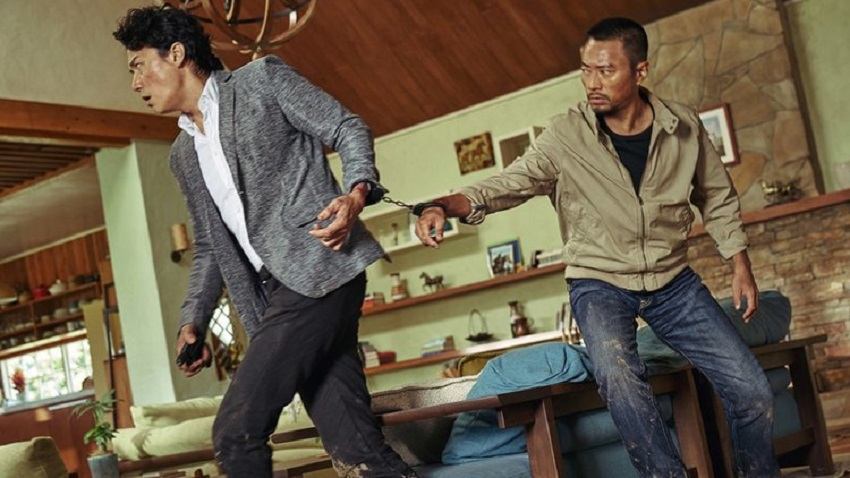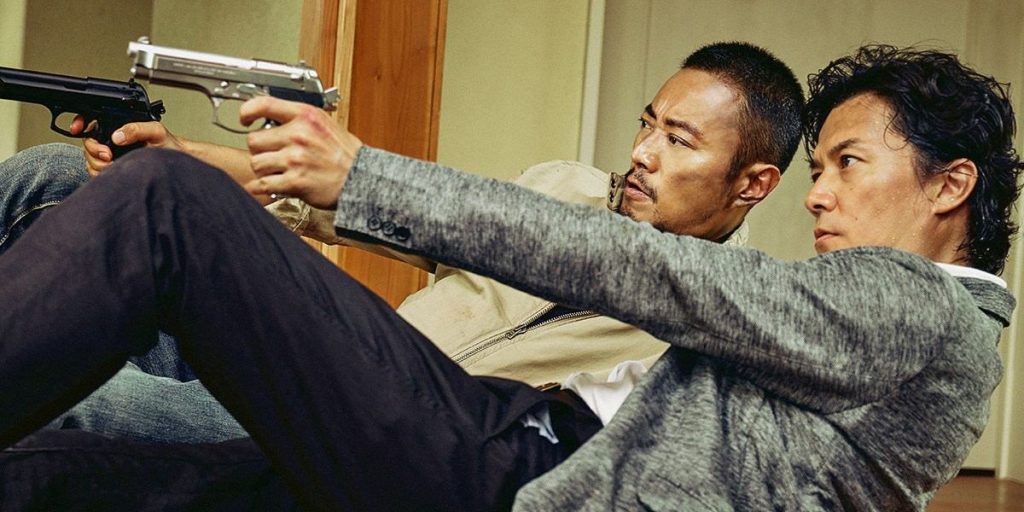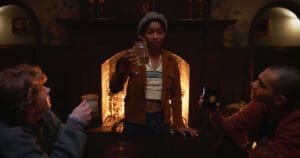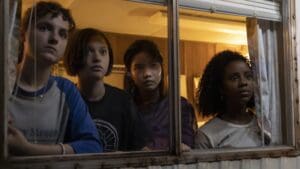Summary
A self-parodic celebration of John Woo’s prolific action career, Manhunt, despite a few tremendous action scenes, nonetheless succumbs to pastiche.
My love for the career of John Woo is enthusiastic and hardly a secret, in particular for 1992’s Hard Boiled, which I wholeheartedly consider a masterpiece, and 1997’s Face/Off, which is perhaps the most sincerely deranged action thriller ever committed to film. Manhunt, then, which I saw last year but which debuted on Netflix today, should be right up my street. It’s an enthusiastically self-referential plundering of Woo’s extensive career, particularly his glory years of balletic, nonsensical mayhem, when he ruled the high-concept, low-brow quarter of Hong Kong action filmmaking with a twin-gunned, dove-fluttering, slow-motion majesty that has never been equalled.
As it happens, a few typically-wonderful action sequences notwithstanding, I’m not particularly keen on Manhunt. When I threw the thing on Netflix earlier to refresh my memory of it, I was reminded of this fact almost immediately by the film’s opening sequence, which contains the following dialogue exchange: “It’s like in those old classic films!” “You like old classic films?” “I love old classic films!” “Wait, I have a DVD of an old classic film in my car, let me get it for you.”
Now, I hardly expect Shakespearean dialogue in a John Woo film, but that particular exchange is so aggressively terrible that I blushed even reproducing it. What’s worse is that Manhunt’s new home on Netflix led to further complications. None of this was Netflix’s fault, mind you, and was much more a symptom of my frazzled and overworked memory, but you’ll see what I mean. See, in that opening scene, Woo also deploys an odd style of editing that freezes an image for roughly a second before transitioning to the next one, which I’d forgotten about and took to mean that I was having internet trouble. Characters also speak in subtitled Chinese, but also occasionally in English, which for some reason is also subtitled, and this confused me because I was reading the dialogue faster than the characters were speaking it. Perhaps this is why people boo such things at festivals.

Nevertheless, Manhunt walks a fine line between homage and pastiche; during chases and shootouts, it is the former, and in every other respect it is the latter. I have very little tolerance for self-parody, even if what is being parodied was unashamedly daft to begin with. There’s a faint whiff of desperation about the exercise, which Manhunt shares, and its attempts to dig up and polish the once-inventive extravagances of John Woo feel faintly depressing.
The plot is, of course, not at all the point, and lifted from the 1976 film of the same name by Junya Sato, which was itself an adaptation of the book, again of the same name, by Juko Nishimura. It nonetheless concerns a dapper but not at all smooth-talking lawyer, Du Qiu (Zhang Hanyu), who occasionally completes lucrative but morally unsound legal work for a shady pharmaceutical corporation headed by Sakai (Jun Kunimura). The woman Du Qiu was sharing a love of classic film with in that opening sequence, Rain (Ha Jiwon), happens to be Sakai’s muscle, a gunslinging orphan assassin who, along with her sister, Dawn (Angeles Woo, John’s daughter), keeps twin pistols in the sleeves of her kimono.

Du Qui is predictably framed for murder and forced to go on the run from a, again predictably, dogged copper by the name of Yamura (Masaharu Fukuyama), who he eventually (and, all together now, predictably) grudgingly allies himself with to bring the pharmaceutical company down. This is a process that involves a jet-ski chase, a scene in which Du Qui and Yamura fight off goons while handcuffed together, and the destruction of a shed that inexplicably contains a supply of white doves.
Manhunt is a kitschy sprint through 90s nostalgia, so you can expect such Woo-isms as superior slow-motion gun-fu scored to sax music and the fluttering of dove wings, but what you shouldn’t expect is anything resembling developed characters or legitimate dramatic stakes, or even, now that I think about it, a thorough grasp of language, English or otherwise. Whether or not you are expecting such things will determine your tolerance for Manhunt, which, if it lacks the charm of the director’s best work, still confirms his action bona fides.
I don’t dislike Manhunt, obviously, as I’m genetically incapable of disliking a John Woo action film, even one that doesn’t hold much respect for itself. But I’d much prefer it if the filmmaker returned to his old stomping ground to make something that might redefine the genre in the way that his best stuff did – without it needing to point at itself to remind everyone how he good he can be.



